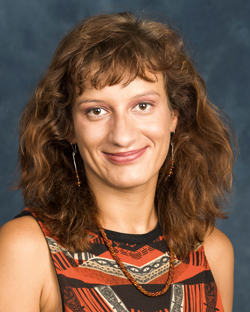By Eva Trieger


SAN DIEGO — Latin is a dead language. This is defined as “one that has no native speakers.” Jana Mazurkiewicz Meisarosh is on a mission to make sure that Yiddish never goes the way of Latin. And she’s succeeding. Two years ago, the doctoral candidate from the Slavic Languages Department at the University of Michigan founded the Yiddish Arts and Academics Association of North America (YAAANA) and brought “Yiddish culture to the public sphere through accessible and engaging programming that exposes the general public to the richness, depth, and multi-faceted nature of living Yiddish culture.” While Meisarosh launched the organization on her own, UCSD is now a proud partner. To date, YAAANA has attracted individuals from Mexico City, Israel, and Russia.
Meisarosh is a playwright, intent on exposing all people to Yiddish culture. She has written and produced a handful of plays, one being the re-enactment of her own wedding, with musician and narrator Yale Strom and the multilingual Elizabeth Schwartz, as well as her husband, Ed. Then there was Wooden Wars. In this 2015 play, Meisarosh relays a tale of four Catholic children who discover they may have Jewish roots. The title refers to wooden or clay figures that are contemporary amulets in Polish culture. These figures are believed to bring good luck, whether they are wooden crosses or wooden representations of Jews.
Thanks to the Fringe Festival, Meisarosh is pleased to present a world premiere of Kraft to San Diego audiences. Playwright Leah Hoffman was born in Latvia in the late nineteenth century. At the age of fourteen, she began writing plays and poetry, but as she was female, it was difficult to get published. Hoffman moved to the United States in 1913. She was able to write children’s poetry books and later published the first Yiddish-language book of children’s literature in 1919. Many Yiddish-speaking school children read these stories in primers.
A one-act play, Kraft, Yiddish for power, tells the story of civilization and the “energy it takes to fuel it.” Meisarosh told me the play is much deeper than it appears on the surface, and it is not to be considered fast-food but requires thought, reflection, and rumination. The actors learned to speak their lines in Yiddish, as seen in this short clip filmed during a very early rehearsal The play poses the question: “Does technology help us or hurt us?” Only one role is human, the Slave. The other characters represent abstract ideas and innovations. Meisarosh assured me that it is accessible to everyone of all ages. One need not speak Yiddish, or be Jewish, to enjoy the play. Subtitles will provide translations, and the material is relevant to all.
Kraft will open June 6 at Royter’s kitchen. Subsequent performances will take place June 11 at the Cygnet Theater, and June 12 at a location to be determined. On June 16th a 2 p.m. performance is slated for UC San Diego Room 121 in Pepper Canyon Hall. A final performance will be hosted by New Village Arts on June 16 at 7 p.m. Tickets may be purchased online by clicking here.
If you’re curious to learn more about Yiddish, the language, art, literature, cooking, and Polish Jewish culture, YAAANA has a class for you. If you’re eager to share your Yiddishkeit and can volunteer your time, YAAANA has a place for you. Please contact jana@yaaana.com.
*
Trieger is a freelance writer who specializes in coverage of the arts. She may be contacted via eva.trieger@sdjewishworld.com